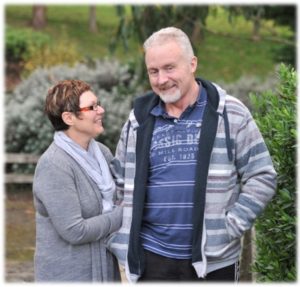Dave Griffin (Dunedin – New Zealand)
Dave had an ischemic stroke on his left side on the 1st December 2012. Day 3 we were told if he lives then he would be in palliative care. He was left with tightrope weakness and severe expressive aphasia.
What etanercept did for Dave:
After reading this material closely and talking a lot with some very patient scientists, we decided to proceed with treatment at Dr Tobinick’s clinic in Los Angeles. Dave had his first treatment Monday 2 June 2014, and within 4 minutes of the injection we could see improvement. Dave said he felt a rush to his brain and could think ‘clearer’. Pre -tests were done before Dave had his injection and testing again after 2 hours, where there was definite improvement.
These are the distinctive changes/improvements we have seen to date (post treatment):
- Dave can think more clearly, understand and process what is being said to him more readily and follow commands.
- His eyesight has cleared. (This is based on his vision tests at the time of treatment)
- He now knows everyone’s middle name, and can say them.
- He has stopped coughing and clearing his throat continually
- His voice is stronger and the words he uses are more defined.
- The right side of his face has feeling – previously numb around the cheek and lower jaw
- His sense of taste has returned. I wasn’t aware how bad this had been for him until post treatment his face lit up when he had a coffee and indicated he could really taste it. He now enjoys food as it’s not all texture.
- His shoulder is moving into a more natural position where previously the shoulder was dropped, heavy and painful for him.
- His right arm hangs more naturally, his hand is less clenched and warm to touch.
- His right leg is lighter and he no longer drags his foot. This happened within 20 minutes after his first treatment, Dave went to the bathroom and when he walked back into the treatment room he raised his foot to step up to the chair. For Dave this was something he recognized as a change.
- He has more energy, three days after his first treatment, he walked 3 miles to a shopping centre in LA, had lunch and did some shopping with me, and then we walked all the way back to our hotel. Before he had trouble walking to the letterbox – less than 300 meters from the house.
- Dave is less fatigued, he sleeps less and wakes up alert. Previously he struggled getting up in the mornings and would need to rest straight after breakfast. Bed time was 8pm – now its closer to 9-9:30pm (normal for us). Dave sleeps deeper and doesn’t snore; something that was prolific post stroke and prior to treatment.
- Crowds or noisy places don’t faze him anymore. He keeps showing me his head and tapping it saying better, he smiles more and his sense of humour has returned.
- Dave can read more words and can say them out loud, he even surprises himself some days.
Now he can get yes and no’s in the right place, and this is continually improving.
- Since being back home we have noticed Dave has regained his sense of smell
- He is now more involved in household routines and duties.
- His carer, trainer, and physiotherapist have all said they see large changes in him. So it is not just my imagination. For instance, his physio wrote:
“Thanks for the email. Dave booked in as requested at 3pm M, W and F. I see what you mean about a smile on his face, improved use of words and better finger opening – Dave agreed we should continue with the hand focus. Great to see him so full of spark today! Cheers LEIGH HALE • ASSOCIATE PROFESSOR AND DEPUTY DEAN SCHOOL OF PHYSIOTHERAPY / TE KURA KOMIRI PAI • UNIVERSITY OF OTAGO”
A placebo?
You may think Dave’s response to his treatment is, a placebo effect. In other words, what we were told would happen only happened because we wanted to believe. Maybe some of these outcomes could be explained away under that theory – but not all of them. Can you explain to me why his sense of taste was, and remains, dramatically improved, a big change in his everyday life. Unexpectedly to any of us, he raved with joy over the taste of coffee, sugar and milk within a half an hour of being treated. Yet he had never complained of taste loss to me. I wasn’t aware his sense of taste and smell had been impacted even though it is supposedly common. I had never been advised of this as a possibility but it was apparent post treatment that it had in fact had an impact on Dave and loss of taste and smell had an effect on him. From what I understand of a ‘placebo effect’; it is an expectation put in place, before treatment, about the outcome. The last thing Dave had been led to expect was that this massive practical taste improvement would occur. To me, this argues against the rest of the improvements being simply an impact of what we were hoping would happen. (Posted 08.02.2017)
Follow the link to Dave’s Newspaper story online in the Otago Daily Times (25.11.2017):
http://www.odt.co.nz/regions/southland/321186/call-approve-etanercept-nz
7,524 total views, 15 views today

